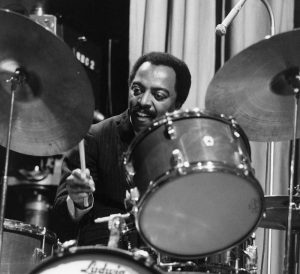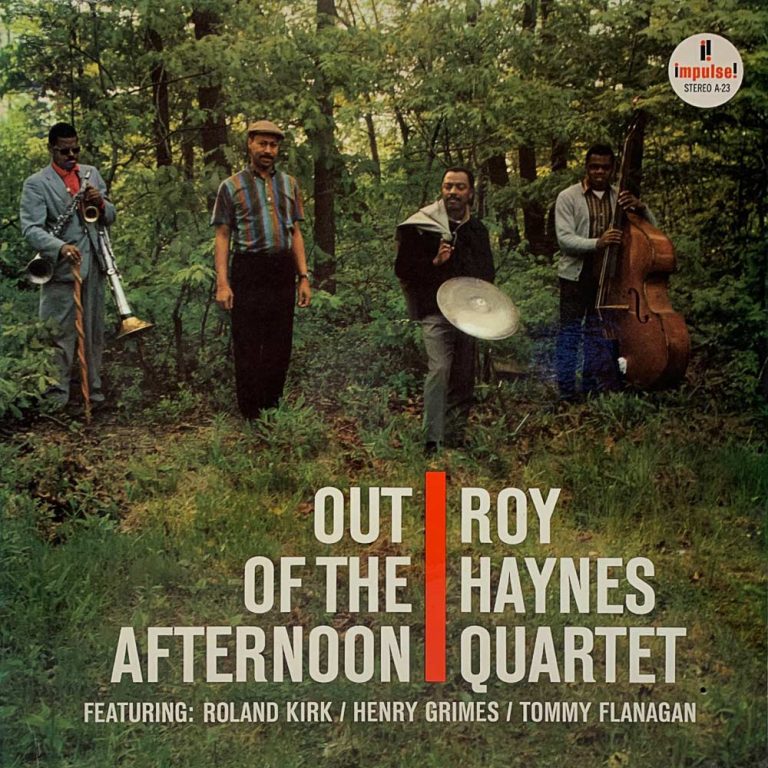The master of the sizzling drum kit Roy Haynes and his often overlooked album “Out Of The Afternoon” with a one-off quartet gets a much-needed re-press.
Something of an oddity in Haynes’ discography, this album has stood the test of time, and is a favourite among collectors for several reasons. It’s the summer of 1962, and the players are operating at the height of their quite exceptional improvisational powers.
A 26 year old Henry Grimes, fresh from playing bass with Mingus, Monk and Sonny Rollins, is in fine form, pianist Tommy Flanagan had already made a name for himself playing with Miles Davis, Sonny Rollins, and with John Coltrane on “Giant Steps”, and his ear for supportive voicings with distinct character are in full effect.
Roland Kirk, still relatively early in his career, makes a rare appearance as a sideman. He brings his full selection of instruments, which included tenor saxophone, manzello, strich, flute, and nose flute. Kirk’s playing is more restrained and considerate than usual, maybe because he’s a sideman on this date. But he still brings a certain wildness to the recordings without overshadowing the other players. Roy Haynes brings his signature effervescent cymbal-play, coupled with hard-swinging yet subtle musicality across the kit.

Haynes was already very much a veteran at this point, having transitioned from big band to bebop and beyond, and had already played with a literal who’s who of jazz greats – from Lester Young and Billie Holiday, to Charlie Parker, Miles Davis and Sarah Vaughan among many others.
Haynes’ drumming technique started to become freer towards the end of the 1950s. He began to place drum fills in a more melodic context rather than just at the end of 12 or 16 bars. As this more fluid style developed, Haynes appealed to more progressive players, and in the years preceding “Out Of The Afternoon,” he recorded with more experimental musicians like Dolphy and Monk.
The recording session came together organically, with Haynes and Kirk meeting at the Five Spot Cafe in New York and jamming together. They were excited by the idea to record and Haynes took it to producer Bob Thiele. The session was recorded by Rudy Van Gelder at his Englewood Cliffs studio in New Jersey. With each instrument close-mic’d, every nuance of Haynes’ drum work shines through, from crisp cymbals to snappy snares and rim shots. Meanwhile Kirk’s expressive playing and unusual combinations, especially the strich and tenor-manzello harmonics, give the quartet a somewhat eerie quality.
The album is spread across four standards and three Haynes original compositions, and the quartet have a blast turning swing era classics “Moon Ray” and “Fly Me To The Moon” inside out. But it’s on Haynes’ own songs, especially “Raoul” and “Snap Crackle” that they really let rip.
“Raoul” is pacey at around 170 BPM, and sees Kirk double up on manzello and tenor on the themes, before a manzello solo that fires the group into space. Flanagan’s acrobatic runs on the piano give way to a blistering bowed bass solo from Grimes, one of the very few of the era. Haynes’ own solo is searing, encompassing the full kit in a dizzying array.
“Snap Crackle” is how bassist Al McKibbon described Haynes’ pitched-up drum sound, and Van Gelder does an excellent job of capturing the crackling energy of Haynes’ kit. On this track, the quartet slows the tempo down and Kirk triples-up on tenor-strich-manzello, before an inspired double flute passage that also incorporates sung multiphonics. As solos go, it must have been mind-blowing at the time and has surely helped tear up a few rulebooks since.
“Out Of The Afternoon” sits in jazz history seemingly at a gateway, halfway between tradition and progress. One foot is planted firmly in hard bop idioms, but the other is turned invitingly towards the deconstructive wave of the avant garde that was fast-approaching. In this sense, “Out Of The Afternoon” can be seen as a master and his quartet intuitively and restlessly searching for the sounds that lie beyond what they know – and for that, it’s thrilling.
Max Cole is a writer and music enthusiast based in Düsseldorf, who has written for record labels and magazines such as Straight No Chaser, Kindred Spirits, Rush Hour, South of North, International Feel and the Red Bull Music Academy.
Header image: David Redfern/Redferns via Getty Images.



